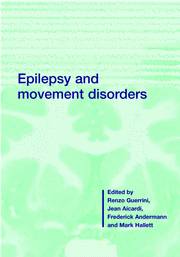Book contents
- Frontmatter
- Contents
- List of contributors
- Preface and overview
- 1 Epilepsies as channelopathies
- 2 Epilepsy and movement disorders in the GABAA receptor β3 subunit knockout mouse: model of Angelman syndrome
- 3 Genetic reflex epilepsy from chicken to man: relations between genetic reflex epilepsy and movement disorders
- 4 Functional MRI of the motor cortex
- 5 Neuromagnetic methods and transcranial magnetic stimulation for testing sensorimotor cortex excitability
- 6 Motor dysfunction resulting from epileptic activity involving the sensorimotor cortex
- 7 Nocturnal frontal lobe epilepsy
- 8 Motor cortex hyperexcitability in dystonia
- 9 The paroxysmal dyskinesias
- 10 Normal startle and startle-induced epileptic seizures
- 11 Hyperekplexia: genetics and culture-bound stimulus-induced disorders
- 12 Myoclonus and epilepsy
- 13 The spectrum of epilepsy and movement disorders in EPC
- 14 Seizures, myoclonus and cerebellar dysfunction in progressive myoclonus epilepsies
- 15 Opercular epilepsies with oromotor dysfunction
- 16 Facial seizures associated with brainstem and cerebellar lesions
- 17 Neonatal movement disorders: epileptic or non-epileptic
- 18 Epileptic and non-epileptic periodic motor phenomena in children with encephalopathy
- 19 Epileptic stereotypies in children
- 20 Non-epileptic paroxysmal eye movements
- 21 Shuddering and benign myoclonus of early infancy
- 22 Epilepsy and cerebral palsy
- 23 Sydenham chorea
- 24 Alternating hemiplegia of childhood
- 25 Motor attacks in Sturge–Weber syndrome
- 26 Syndromes with epilepsy and paroxysmal dyskinesia
- 27 Epilepsy genes: the search grows longer
- 28 Genetics of the overlap between epilepsy and movement disorders
- 29 Seizures and movement disorders precipitated by drugs
- 30 Steroid responsive motor disorders associated with epilepsy
- 31 Drugs for epilepsy and movement disorders
- Index
- Plate section
30 - Steroid responsive motor disorders associated with epilepsy
Published online by Cambridge University Press: 03 May 2010
- Frontmatter
- Contents
- List of contributors
- Preface and overview
- 1 Epilepsies as channelopathies
- 2 Epilepsy and movement disorders in the GABAA receptor β3 subunit knockout mouse: model of Angelman syndrome
- 3 Genetic reflex epilepsy from chicken to man: relations between genetic reflex epilepsy and movement disorders
- 4 Functional MRI of the motor cortex
- 5 Neuromagnetic methods and transcranial magnetic stimulation for testing sensorimotor cortex excitability
- 6 Motor dysfunction resulting from epileptic activity involving the sensorimotor cortex
- 7 Nocturnal frontal lobe epilepsy
- 8 Motor cortex hyperexcitability in dystonia
- 9 The paroxysmal dyskinesias
- 10 Normal startle and startle-induced epileptic seizures
- 11 Hyperekplexia: genetics and culture-bound stimulus-induced disorders
- 12 Myoclonus and epilepsy
- 13 The spectrum of epilepsy and movement disorders in EPC
- 14 Seizures, myoclonus and cerebellar dysfunction in progressive myoclonus epilepsies
- 15 Opercular epilepsies with oromotor dysfunction
- 16 Facial seizures associated with brainstem and cerebellar lesions
- 17 Neonatal movement disorders: epileptic or non-epileptic
- 18 Epileptic and non-epileptic periodic motor phenomena in children with encephalopathy
- 19 Epileptic stereotypies in children
- 20 Non-epileptic paroxysmal eye movements
- 21 Shuddering and benign myoclonus of early infancy
- 22 Epilepsy and cerebral palsy
- 23 Sydenham chorea
- 24 Alternating hemiplegia of childhood
- 25 Motor attacks in Sturge–Weber syndrome
- 26 Syndromes with epilepsy and paroxysmal dyskinesia
- 27 Epilepsy genes: the search grows longer
- 28 Genetics of the overlap between epilepsy and movement disorders
- 29 Seizures and movement disorders precipitated by drugs
- 30 Steroid responsive motor disorders associated with epilepsy
- 31 Drugs for epilepsy and movement disorders
- Index
- Plate section
Summary
Introduction
Although epilepsy syndromes have been primarily defined by their seizures, the pervasive additional impairments, particularly cognitive and behavioural, are increasingly recognized as being integral to the condition, e.g. cognitive and autistic regression in West syndrome. Landau–Kleffner syndrome (LKS) could hardly be described without the cognitive impairments. Motor impairments have been largely ignored from descriptions of epilepsy syndromes. Such motor phenomena are, however, common. This chapter summarizes the data on five patients with epilepsy-related movement problems that were present over long periods and were quite unrelated to individual seizures. Such impairments, which are present over time, are designated epileptic encephalopathies. They were all responsive to cortico-steroids which were used by analogy with their use in other epileptic encephalopathies, particularly West syndrome and Landau–Kleffner syndrome. The intention in treating these disorders with cortico-steroids is that such drugs are highly effective antiepileptic agents, rather than that they have any other modes of action, but this statement is open to challenge. The potential reversibility of such neurological impairments, which we would usually regard as evidence of fixed brain lesions in association with epilepsy, is of great theoretical interest, since it points to different pathophysiological mechanisms for the production of classical neurological signs (Neville, 1999).
CASE REPORT 1 LANDAU-KLEFFNER SYNDROME WITH GAIT APRAXIA (NEVILLE & BOYD, 1995)
The first child developed complex partial seizures at the age of 5.6 years with rolandic characteristics and, over a period of 8 weeks, she lost all speech and comprehension.
- Type
- Chapter
- Information
- Epilepsy and Movement Disorders , pp. 511 - 516Publisher: Cambridge University PressPrint publication year: 2001
- 1
- Cited by



